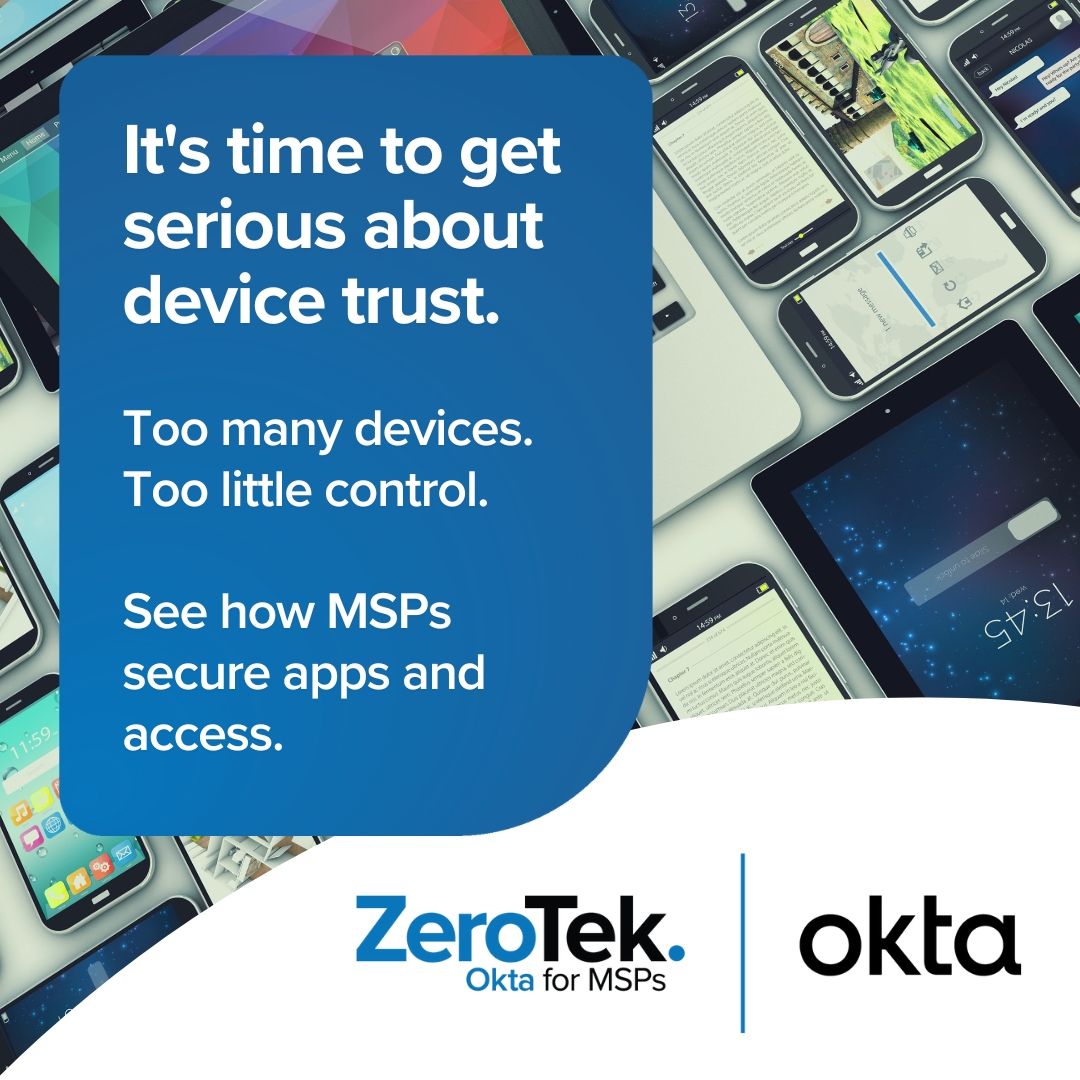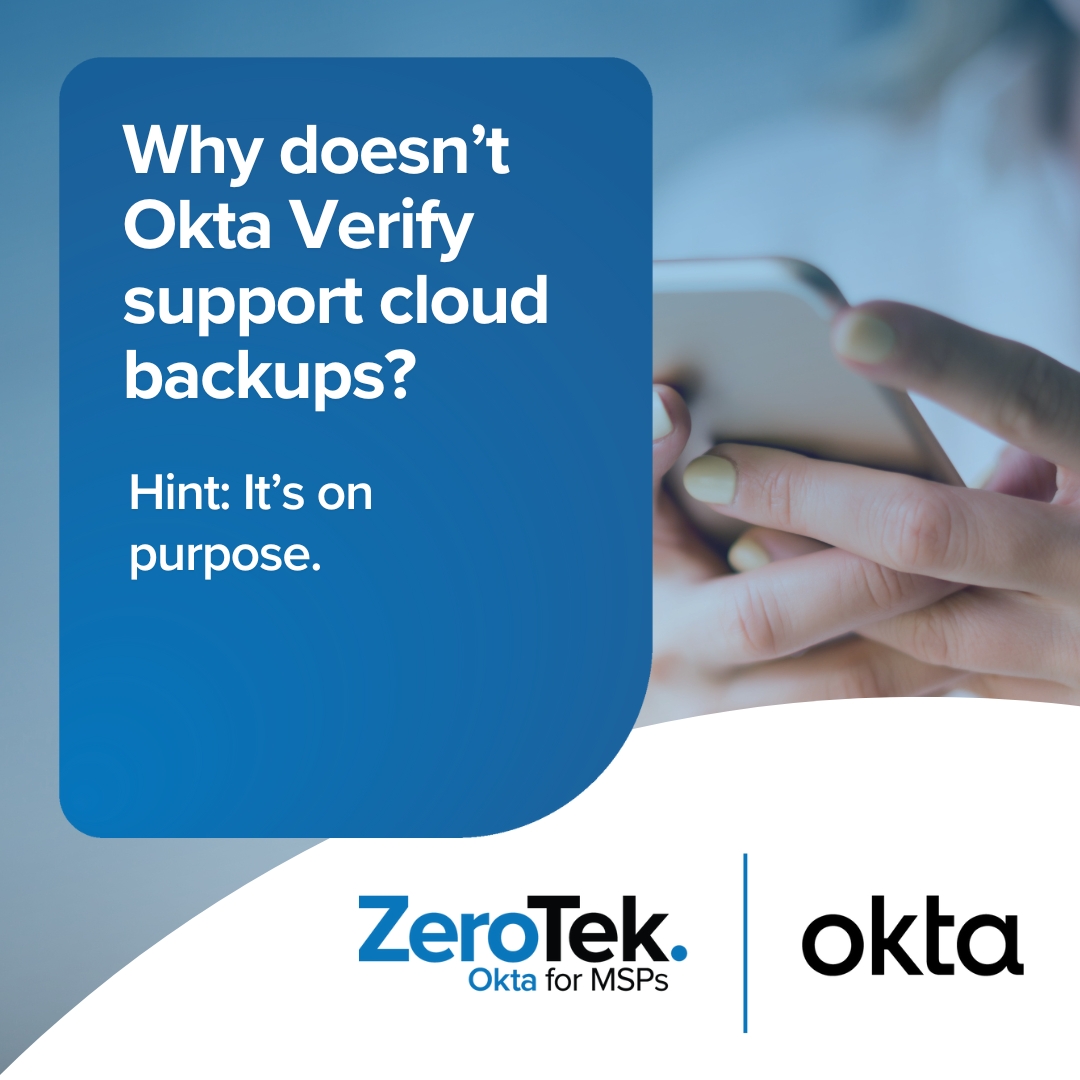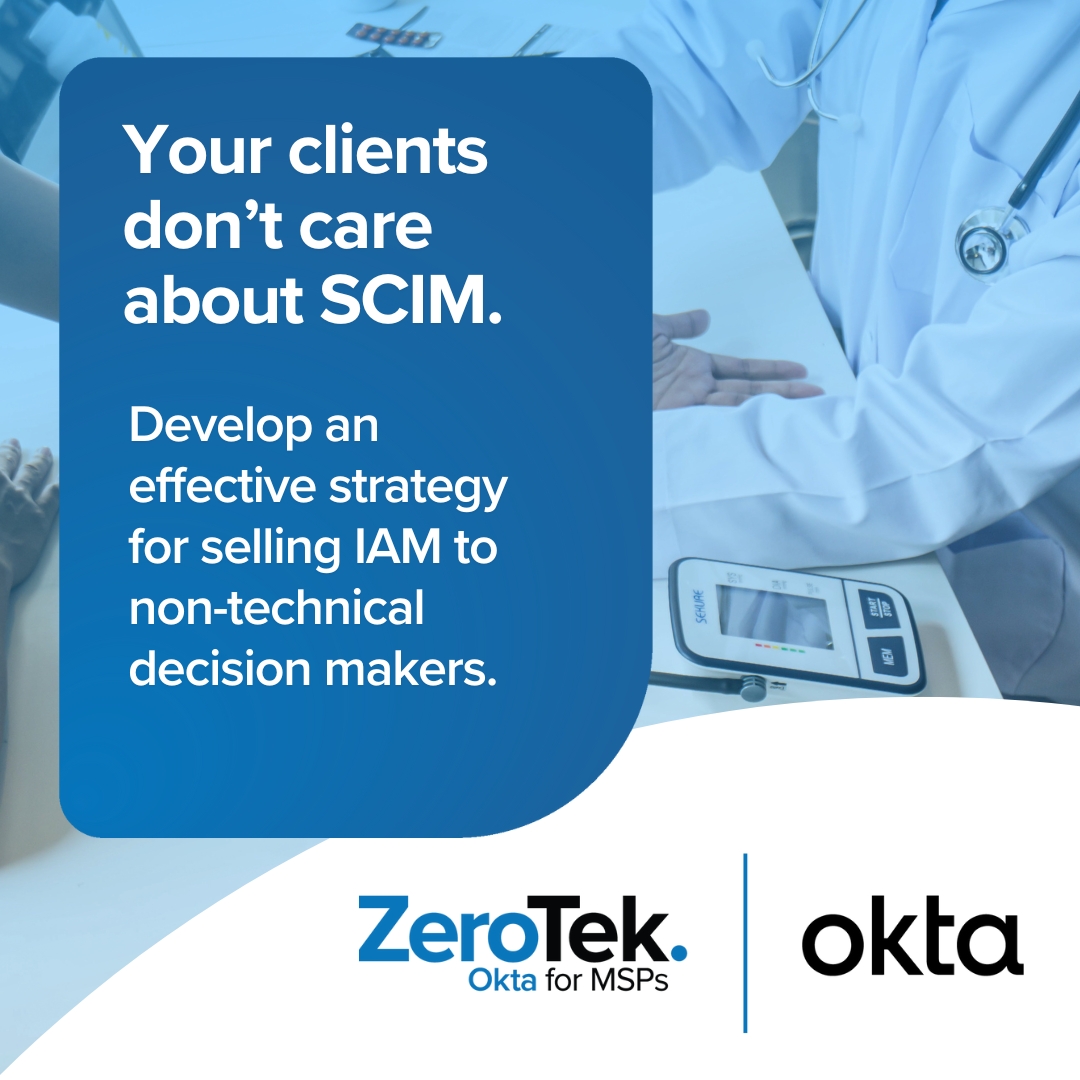Key Takeaways
- Device trust is essential for securing SMB access in many work environments.
- MSPs should roll out device trust strategically, starting with high-risk roles, apps, or clients.
- Okta-powered IAM requires Okta FastPass and MDM tools like Intune or Jamf to enforce compliant device access.
- ZeroTek enables centralized policy management across customer tenants, simplifying enforcement and auditing.
- Device trust supports compliance with HIPAA, NIST, SOC 2, and cyber insurance requirements.
Sections
- Device trust is a strategic opportunity for MSPs in a Zero Trust world
- Why device trust is essential for MSPs securing SMB clients
- Top benefits of device trust for MSPs and their SMB clients
- When MSPs should recommend device trust to SMB clients
- How MSPs can start small with a subset-based device trust rollout
- Step-by-step: How MSPs can implement device trust with ZeroTek and Okta
- Why Okta FastPass and passwordless access are essential for Okta-powered MSP device trust strategies
- Meeting compliance requirements with device trust for SMB clients
- Don’t wait for a breach to prioritize device trust
Sections
- Device trust is a strategic opportunity for MSPs in a Zero Trust world
- Why device trust is essential for MSPs securing SMB clients
- Top benefits of device trust for MSPs and their SMB clients
- When MSPs should recommend device trust to SMB clients
- How MSPs can start small with a subset-based device trust rollout
- Step-by-step: How MSPs can implement device trust with ZeroTek and Okta
- Why Okta FastPass and passwordless access are essential for Okta-powered MSP device trust strategies
- Meeting compliance requirements with device trust for SMB clients
- Don’t wait for a breach to prioritize device trust
Key Takeaways
- Device trust is essential for securing SMB access in many work environments.
- MSPs should roll out device trust strategically, starting with high-risk roles, apps, or clients.
- Okta-powered IAM requires Okta FastPass and MDM tools like Intune or Jamf to enforce compliant device access.
- ZeroTek enables centralized policy management across customer tenants, simplifying enforcement and auditing.
- Device trust supports compliance with HIPAA, NIST, SOC 2, and cyber insurance requirements.
Device trust is a strategic opportunity for MSPs in a Zero Trust world
Device sprawl and hybrid work have made securing SMB environments more complex and critical than ever. For MSPs, helping clients control which devices access business resources isn’t just smart security; it’s a necessity.
Device trust is a strategic identity and access management (IAM) capability that ensures only registered and compliant devices can access sensitive applications. While not every SMB client needs it on day one, knowing when to recommend and how to implement device trust is essential for MSPs offering Zero Trust-aligned services. In this post, we’ll cover the use cases, tools, and best practices MSPs need to successfully roll out device trust using Okta and ZeroTek.
Why device trust is essential for MSPs securing SMB clients
The Identity Defined Security Alliance (IDSA) reports that 84% of organizations were impacted by an identity-related breach in 2024—an ongoing risk that can be significantly mitigated with better identity controls, including device-based access restrictions.
Another 2025 study found that 46% of successful phishing attacks involved personal or unmanaged devices (Verizon Data Breach Investigations Report 2025).
When a user signs in from an untrusted device, even with valid credentials, your security perimeter can be exposed. Device trust mitigates this by enforcing access from only registered and policy-compliant devices.
Top benefits of device trust for MSPs and their SMB clients
- Zero Trust alignment: Complements MFA (multifactor authentication) and SSO (single sign-on) by adding a device layer.
- Stronger compliance: Enables endpoint-based policy controls for HIPAA, SOC 2, NIST SP 800-171.
- Improved risk management: Prevents reuse of stolen credentials or session hijacking on unknown endpoints.
- Operational efficiency: Centralizes enforcement and reporting across customer environments.
When MSPs should recommend device trust to SMB clients
Device trust strategies for MSPs aren’t one-size-fits-all. Consider the following scenarios to determine when to roll it out.
Regulated or compliance-bound clients
Organizations in regulated sectors—such as law firms, healthcare providers, accounting firms, and manufacturers handling controlled unclassified information (CUI)—often require documented proof of device compliance. With device trust in place, ZeroTek’s audit capabilities and comprehensive Okta system logs provide the evidence needed to meet these requirements.
Clients using high-risk applications
If your customer uses tools like NetSuite, QuickBooks, Salesforce, or internal HR platforms, locking down access from unmanaged endpoints is a must.
Clients with remote or hybrid teams
With devices outside the office, a policy layer for device trust ensures only secure devices connect, which is especially important when employees use personal laptops or mobile devices.
Clients seeking or renewing cyber insurance policies
Many business insurers now require evidence of MFA, endpoint protection, and device-based access controls. Without it, premiums can spike, or coverage may be denied entirely.
How MSPs can start small with a subset-based device trust rollout
One of the best strategies for MSPs is a subset-based rollout. Instead of flipping the switch across the board, start with:
- High-risk roles (finance, HR, admin users)
- Specific applications (billing, payroll, CRM)
- Customers with recent incidents (those who have experienced phishing or data exposure)
This approach gives you time to fine-tune enforcement policies, configure endpoint management, and gain customer buy-in with visible security value.
With ZeroTek’s multitenant capabilities, MSPs can easily manage device trust subsets across multiple customers, apply tailored Okta policy rules, and monitor user/device behavior centrally.
Step-by-step: How MSPs can implement device trust with ZeroTek and Okta
1. Register devices in Okta
All users must install the Okta Verify app and add their account. This enrollment process registers the device and enables posture checks for device trust.
2. Use MDM/UEM to manage devices
For unified endpoint management (UEM) and mobile device management (MDM), choose tools like Microsoft Intune, Jamf, or VMWare Workspace ONE. Use them to distribute and install the required certificate profiles Okta uses to establish trust, and then to enforce encryption, antivirus, firewall, and application compliance standards.
3. Enable FastPass (a prerequisite)
Device trust requires Okta FastPass—to link authentication to device identity. Okta FastPass also eliminates passwords and improves the user experience (see next section).
For a deeper exploration of the advantages of Okta FastPass—and why password managers are insufficient to secure user access to apps and data—see our article, What’s the best passwordless strategy for MSPs?
4. Create conditional access policies in Okta
Using ZeroTek, define rules that:
- Require device registration and compliance checks.
- Restrict high-sensitivity apps to managed devices only.
- Deny access entirely from unmanaged or non-compliant devices.
5. Use integrations to enhance insight
Okta integrates natively with CrowdStrike and other EDR/XDR tools. This lets you use real-time device risk signals to block compromised endpoints—even before a user tries to log in.
Why Okta FastPass and passwordless access are essential for Okta-powered MSP device trust strategies
Device trust relies on Okta FastPass, a passwordless authentication method that uses the device itself (combined with user biometrics or PIN) as the credential. And that’s a very good thing for both security and usability. Here’s why FastPass is transformative:
Phishing resistance
FastPass eliminates password-based phishing. There’s no password to steal, intercept, or reuse. Authentication is tied to the device and user biometrics.
Frictionless login
Users don’t type anything. They tap a fingerprint or use face recognition. Access to apps is instant, seamless, and secure.
Stronger posture validation
FastPass works with endpoint management and security posture checks. It enforces that antivirus is active, the OS is not jailbroken, and device encryption is in place.
No user training required
Users already unlock phones and laptops with biometrics. FastPass extends this intuitive method to app access—meaning less support and happier clients.
Centralized MSP control
With ZeroTek’s multitenant dashboard, you can enforce FastPass and device trust policies across all customer Okta orgs. Monitor enrollment, enforce patch compliance, and revoke access—all from one pane of glass.
Meeting compliance requirements with device trust for SMB clients
Device trust helps demonstrate security controls required by:
- HIPAA: Enforcing endpoint encryption and access restrictions.
- NIST SP 800-171: Validating device identity and integrity.
- SOC 2: Auditing access logs by user, device, and app.
- Cyber insurance: Meeting policy requirements for device-based MFA.
With ZeroTek and Okta, MSPs can document, automate, and audit these controls across multiple tenants.
Don’t wait for a breach to prioritize device trust
MSPs that have used ZeroTek and Okta to deploy a device trust strategy see major operational and customer benefits. Dan Le, Founder and CEO of Red Cup IT, and one of our early adopters, put it this way:
“Consider that now things like password reset requests are basically nonexistent with ZeroTek | Okta. That means our help desk is better than ever, because they’re freed up to focus on more critical tasks. We’ve been able to use Okta to roll out mobile device management (MDM), which our customers really like as a layer of assurance, and which we really like for the visibility on how well protected devices are. As an MSP, all of this is really only possible with ZeroTek | Okta.” (Read the Red Cup IT case study.)
Le’s experience reflects the broader value of ZeroTek | Okta for MSPs looking to streamline support, enforce modern device policies, and deliver peace of mind to SMB clients. With ZeroTek | Okta, you can deliver secure, passwordless access that aligns with modern compliance and Zero Trust frameworks—without adding friction or complexity.




